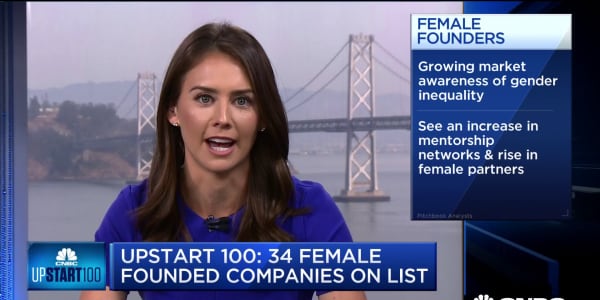Among start-ups to watch in 2017 are these trailblazers, a select group that nearly made CNBC's inaugural Upstart 25 list of the most promising young start-ups. These forward thinkers are building brands and breaking industry barriers on the path to becoming tomorrow's household names. To be eligible, companies had to be privately held and no more than five years old. They also had to have a funding cap of $50 million.
We received more than 500 submissions for the list, which required us to cut more than 95 percent of innovative young companies poised for success. These five caught our attention because of their creative ideas and the lucrative niches they are targeting for growth.
Humanitarian beauty
Founder: Leila Janah
Launched: 2015
Headquarters: San Francisco
LXMI is a groundbreaking new luxury skincare line being sold across the United States that creates a plant-based product from pure, all-natural ingredients to rejuvenate the skin and fight wrinkles. But that's not all that makes this California-based start-up one of a kind.
The company aims to be "the Chanel of social impact" by providing employment opportunities to women otherwise left unable to provide for their families in wartorn African communities. Nilotica nuts, the product's key ingredient, are harvested seasonally in Northern Uganda's Nile River Valley by women who are the widows of men killed in the country's ongoing conflict.
Launched in 2015, this Bay Area start-up's beauty supplies are being sold in 300 Sephora stores and its top-selling product, Pure Nilotica Melt, is a featured product on QVC.
The smart sommelier
Founders: Vijay Manwani, Geoff Lansberry, Mike Tomovich
Launched: 2012
Headquarters: Boston
Do you wish you could drink a glass of wine without the commitment of opening an entire bottle? Well, now you can, thanks to Kuvee. Kuvee's changing the way consumers drink wine by offering a patented wine bottle that keeps the oxygen out of an open bottle, preventing spoilage.
Using smart connected technology to learn your wine preferences, Kuvee makes suggestions for other wines you might enjoy from the company's catalog of compatible products, ranging from $15 to $55. And it even makes recommendations for which foods are best to pair with each wine. Running out of wine? No worries. Order your next round straight from the bottle!
Kuvee has shipped more than 1,000 systems since launching its e-commerce platform in late 2016 and has plans to expand in 2017.
A robocop reality?
Founders: William Santana Li, Stacy Stephens
Launched: 2013
Headquarters: Mountain View, California
The infamous mall cop may soon be a thing of the past. Not because shopping malls across the nation are closing their doors but because one Mountain View, California, start-up has been developing a robot to spot thieves and deter crime since 2013.
Knightscope's robot uses a combination of software, hardware and humans to create a machine that major clients, including the Sacramento Kings professional basketball team, and Westfield Shopping Centers, are implementing to predict and prevent crime that has a $1 trillion economic impact in the United States.
The company has its eyes set on disrupting the $500 billion security industry. Founder William Santana-Li told Jim Cramer the host of CNBC's Mad Money that an off-duty, armed security guard can cost up to $90 per hour, while Knightscope costs a company just $7.
Santana-Li's start-up is growing at a rapid pace, with January 2017 contracts totaling more than the entire year of 2016 combined. These robots may soon be rolling into an establishment near you.
Consumer body scanning
Founders: Dipra Ray, Melody Shiue, Andy Wu
Launched: 2012
Headquarters: Sydney, Australia
Australia boasts one of world's highest life-expectancy rates, with the island-nation's inhabitants spending more than $8 billion a year on health and wellness. Launched in 2012, mPort is the latest tool to hit the market that's giving health-conscious Aussie's a new way to look at their health, wellness and body image.
How does it work? mPort is bringing the power of 3-D body mapping to consumers seeking new ways to holistically track and assess their body. While similar services require a health-care practitioner, mPort puts the user in control with easy-to-use, non-invasive infrared technology to capture thousands of data points in less than 10 seconds.
Similar machines simply measure body mass, but mPort's founders see a future where the device benefits clothing retailers to produce ready-to-wear fitted clothing and government entities to combat rising health-care costs.
Five years after its founding, the company is expanding its footprint and continuing to make a name for itself in the United States, its first international market. It will bring its 3-D measurement technology to select LA Fitness locations in California.
A non-GMO vitamin
Founder: Katerina Schneider
Launched: 2016
Headquarters: Los Angeles
Have you ever looked into the hidden ingredients found in your over-the-counter vitamins? Neither had Katerina Schneider, founder of Ritual, before she became pregnant and in need of the perfect prenatal vitamin.
Ritual is a new vitamin born from the belief that better health begins with better ingredients. Schneider found that many traditional vitamins contain harmful colorants, hidden or misleading ingredients and unproven dosages. Ritual's ingredients are non-GMO, vegan-, gluten- and soy-free and are all open-source, meaning that you will always know exactly what you're putting in your body.
The company recently hired Liz Reifsnyder, former director of strategy and business development for Dollar Shave Club. So look out, Ritual might become the next consumer products start-up to become a billion-dollar megabrand.






